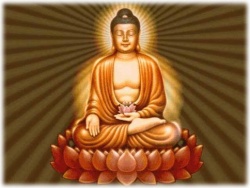Difference between revisions of "Peace and Sustenance"
| (2 intermediate revisions by the same user not shown) | |||
| Line 1: | Line 1: | ||
[[File:Gns.jpg|thumb|250px|]] | [[File:Gns.jpg|thumb|250px|]] | ||
| + | |||
| + | |||
| + | |||
| + | |||
| + | |||
| + | |||
| + | |||
| + | |||
| + | |||
<poem> | <poem> | ||
| − | + | [[Peace and Sustenance]] | |
| − | [安養国] (Skt [[Sukhavati]]; Jpn An’yo-koku or Annyo-koku) | + | [[安養国]] (Skt [[Sukhavati]]; Jpn [[An’yo-koku]] or [[Annyo-koku]]) |
| − | Another name for Perfect [[Bliss]], the land where [[Amida | + | Another [[name]] for Perfect [[Bliss]], the land where [[Amida Buddha]] is said to dwell. The [[Sanskrit]] [[name]] [[Sukhavati]], which means [[land of happiness]] or [[pleasure]], was rendered in {{Wiki|Chinese}} as [[Peace and Sustenance]], [[Perfect Bliss]], or [[Peace and Delight]]. The [[Buddha]] [[Infinite Life Sutra]], a {{Wiki|Chinese}} translation done by the [[Indian]] [[monk]] [[Samghavarman]] in 252, contains both the names [[Peace and Sustenance]] and [[Peace and Delight]], but does not refer to [[Perfect Bliss]]. In the [[Amida Sutra]], translated by [[Kumarajiva]] in 402, only the [[name]] [[Perfect Bliss]] appears. The [[Lotus Sutra]] also refers to the land of [[Amida]] [[Buddha]]: The [[Lotus Sutra]] of the Correct Law, [[Dharmaraksha's]] {{Wiki|Chinese}} translation produced in 286, the oldest of the three extant {{Wiki|Chinese}} versions, employs the [[name]] [[Peace and Sustenance]]. The [[Lotus Sutra]] of the Wonderful Law, translated into {{Wiki|Chinese}} by [[Kumarajiva]] in 406, uses [[Peace and Delight]]. Eventually, the [[name]] [[Perfect Bliss]] became the most common rendering. |
| − | See also [[Peace | + | See also [[Peace and Delight]]; [[Perfect Bliss]]. |
</poem> | </poem> | ||
{{R}} | {{R}} | ||
Latest revision as of 01:19, 14 January 2024
Peace and Sustenance
安養国 (Skt Sukhavati; Jpn An’yo-koku or Annyo-koku)
Another name for Perfect Bliss, the land where Amida Buddha is said to dwell. The Sanskrit name Sukhavati, which means land of happiness or pleasure, was rendered in Chinese as Peace and Sustenance, Perfect Bliss, or Peace and Delight. The Buddha Infinite Life Sutra, a Chinese translation done by the Indian monk Samghavarman in 252, contains both the names Peace and Sustenance and Peace and Delight, but does not refer to Perfect Bliss. In the Amida Sutra, translated by Kumarajiva in 402, only the name Perfect Bliss appears. The Lotus Sutra also refers to the land of Amida Buddha: The Lotus Sutra of the Correct Law, Dharmaraksha's Chinese translation produced in 286, the oldest of the three extant Chinese versions, employs the name Peace and Sustenance. The Lotus Sutra of the Wonderful Law, translated into Chinese by Kumarajiva in 406, uses Peace and Delight. Eventually, the name Perfect Bliss became the most common rendering.
See also Peace and Delight; Perfect Bliss.
